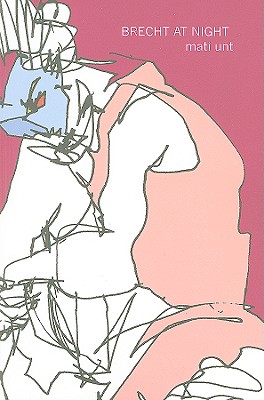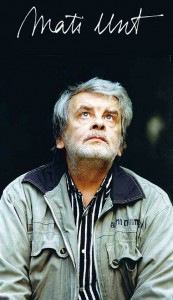Book Review: How To Sing in Dark Times — “Brecht at Night”
I am one of the judges for the Best Translated Book Award (fiction division) sponsored by Three Percent. The five finalists will be announced in New York on February 16th. Three Percent honcho Chad Post needed help to meet his goal of posting a commentary on each of the 25 volumes on the BTB’s fiction long list. Here’s my piece about Brecht at Night — by the late Estonian novelist and theater artist Mati Unt.
Brecht At Night by Mati Unt, translated from the Estonian by Eric Dickens, Dalkey Archive Press (Baltic Literature Series), 209 pages, $13.95
Reviewed By Bill Marx
In the dark times
Will there also be singing?
There will also be singing
About the dark times.
Bertolt Brecht, Svendborg Poems
 But can an artist who has absorbed some of “the dark times” sing of them? Questions of political opportunism, as well as the twisted prerogatives of creative egotism, drive Estonian writer Mati Unt’s postmodern, historical novel Brecht at Night. Unt isn’t concerned about how playwright and poet Bertolt Brecht sang about the rise of Hitler and Stalin or the outbreak of World War II in Europe.
But can an artist who has absorbed some of “the dark times” sing of them? Questions of political opportunism, as well as the twisted prerogatives of creative egotism, drive Estonian writer Mati Unt’s postmodern, historical novel Brecht at Night. Unt isn’t concerned about how playwright and poet Bertolt Brecht sang about the rise of Hitler and Stalin or the outbreak of World War II in Europe.
Instead, Unt examines, via an arch vaudevillesque irony, the narcissistic machinations of Brecht in the year 1940 when, fleeing Nazi Germany, he and his entourage of wife, mistresses, and children end up in Finland, the guests of playwright Hella Wuolijoki, a rich Communist sympathizer with Estonian roots. It is the portrait of the artist as a determinedly abstracted man, aside from his paranoid fear that Hitler has sent out assassins to kill him.
Unt’s Brecht is primarily concerned with making it to America, not attempting to make sense of the gathering forces of the night, which would touch on his uneasy relationship with the Soviet Union, Stalin, and Communism. The general impression left by the book is that it isn’t fear of censorship so much as a pervasive, inner decay that holds Brecht back from dealing with reality: “The worse thing for a writer is not, Brecht thinks, having to keep your mouth shut. It’s a lot worse when you have nothing to say via that mouth.”
Sadistically, Unt, a narrative kibitzer in the book, surrounds Brecht with realities that should have given the writer plenty to talk about. He provides excerpts from non-fiction accounts (newspaper articles, academic studies) of the horrendous happening in Europe, with a grim emphasis on the Soviet Union’s thuggish highjacking of Estonia. He also provides potted biographies of Brecht’s friends and lovers, showing how they were used and abused by Brecht and by history, camp followers betrayed or left on their own to survive.
All of this could have been heavy-handed—Brecht the selfish artist slapped around, over and over, in a circumscribed barrel. At his best, however, Unt brings sardonic humor to the dark proceedings, perhaps tapping on his own feelings about being an artist (playwright, novelist, director) bottled up by the Soviet Union. Unt’s Brecht chooses to see the world through Marxian rules, Hegelian hocus-pocus: “The covert theme of the book is, of course, dialectics, Brecht’s greatest love.” That streamlined notion of Brecht’s vision isn’t entirely fair, at least to his poetry, which at the time made use of ambiguity and skepticism, a satire made of mockery.
Still, the character’s intellectual triangulation amusingly seems to free him from looking too deeply at the demands of the here-and-now, aside from the sexual and secretarial demands he makes on the women in his life. (Unt draws on John Fuegi’s biography The Life and Lies of Bertolt Brecht, which details the author’s swinish treatment of women.) Occasionally the author tries to wake Brecht up via an impish surrealism, such as having a very un-dialectical frog pop up in his room to give him a scare.
Unt includes a memorably funny chapter about a real-life Estonian government official who served as a stooge for the Soviets named M Unt (no relation to the author). The guy counts down his acts of repression before his bosses murder him: “Lithuania has been accepted as part of the Soviet Union (3rd August). There’s still time to go before my death.”

Still, it is difficult to keep the inventive black humor coming, and by mid-point Brecht at Night increasingly shoves the title artist aside to chronicle the lethal facts of Soviet domination. The book’s imagination gives way to presentation; it suggests that Unt lost interest in drawing (and re-drawing) ironic attention to Brecht’s disinterest in reality, his obsession with bourgeois comfort during a time of chaos. If Unt had included more of the undialectical consciousness that informs the (anti)lyrics in Svendborg Poems, the book’s exploration of the amoral writer-in-exile would have been richer and more compelling. Unt has a considerable reputation as a stage artist—but there is surprisingly little dramatic conflict in the book. His Brecht devolves into a didactic puppet.
Unt’s other novels available in English, Things in the Night and Diary of a Blood Donor, tap on rich veins of fantasy (apocalyptic meltdown, vampirism) to evoke the brutal truths about the somnambulism of life under (or after) the domination of the Soviet Union. In Brecht at Night the author speaks openly and powerfully about the crimes of authoritarian barbarity, the degradation of creativity and morality, and the slippery slope of self-involvement. But one misses his customary wildness, his imaginative gusto, as he goes about it.
Bill Marx is the Editor-in-Chief of the Arts Fuse. For just over four decades, he has written about arts and culture for print, broadcast, and online. He has regularly reviewed theater for National Public Radio Station WBUR and the Boston Globe. He created and edited WBUR Online Arts, a cultural webzine that in 2004 won an Online Journalism Award for Specialty Journalism. In 2007 he created the Arts Fuse, an online magazine dedicated to covering arts and culture in Boston and throughout New England.
Tagged: Bertolt Brecht, Brecht at Night, communism, Dalkey Archive Press, Estonia, Estonian, fiction, hitler, Mati Unt
